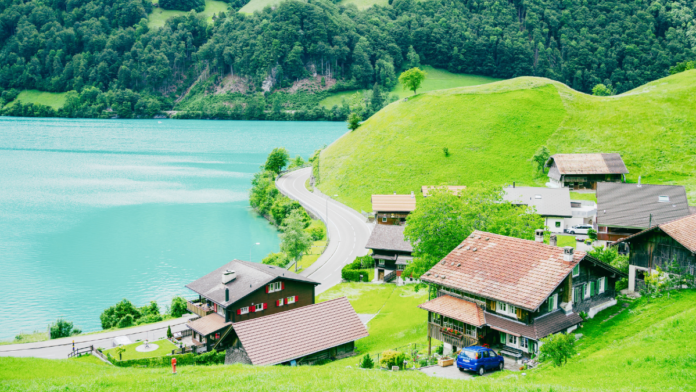Why travel to Switzerland? The answer is very simple. Switzerland is a stunning country, and that is why it should be at the top of your travel bucket list this year.
Switzerland has something for everyone, whether you’re a fan of breathtaking natural landscapes, historic cities, or adrenaline-pumping adventures.
Allow HTC News to guide you into the best places to visit, the most efficient ways to travel around the country, and a breakdown of travel costs. Ready to plan your Swiss adventure? Let’s dive in!

The Best Places to Travel in Switzerland
Majestic Swiss Alps
Switzerland is synonymous with the Alps, and for good reason. The Swiss Alps offer some of the world’s most breathtaking views and exhilarating activities.
Zermatt and the Matterhorn: The Matterhorn, one of the world’s most iconic peaks, is a must-see. At its base, the charming village of Zermatt offers skiing, hiking, and mountaineering adventures.
Jungfrau Region: Known as the “Top of Europe,” this area features the Jungfraujoch, the highest railway station in Europe. The views from the Aletsch Glacier and the Eiger are unmatched.
Beautiful Swiss Cities
While Switzerland is known for its natural elegance, its cities are equally enchanting. Immerse yourself in Swiss culture by exploring the local traditions and customs.
Zurich: The largest city in Switzerland, is a cultural and financial hub. It’s known for its vibrant nightlife, upscale shopping, and rich history. Visit the Old Town for a dose of history, or enjoy the vibrant nightlife and upscale shopping.
Geneva: Home to countless international organizations, Geneva is a cosmopolitan city with a picturesque lakefront. Don’t miss the Jet d’Eau, one of the tallest fountains in the world.
Lucerne: This quintessential Swiss city boasts a stunning lake, a charming old town, and the iconic Kapellbrücke (Chapel Bridge).
Idyllic Swiss Countryside
For a more tranquil experience, the Swiss countryside offers lush landscapes, picturesque villages, and a slower pace of life. It’s a perfect get-away from the hustle and bustle of the cities.
Interlaken: Nestled in the middle of Lake Thun and Lake Brienz, Interlaken is the gateway to numerous outdoor adventures. Paragliding, skiing, and boat trips are just a few of the activities offered.
Lauterbrunnen: Known for its stunning waterfalls, this valley is a paradise for hikers and nature lovers.
Bernese Oberland: This region has charming villages and beautiful mountain scenery. Don’t miss the stunning Lauterbrunnen Valley and the charming village of Grindelwald.
UNESCO World Heritage Sites
Switzerland is home to several UNESCO World Heritage Sites that are worth exploring.
Old Town of Bern: The capital city of Switzerland, Bern, boasts a medieval old town that is a UNESCO World Heritage Site. Stroll through its cobblestone streets and be amazed at the well-preserved architecture.
Lavaux Vineyards: These terraced vineyards along Lake Geneva offer delicious wine and spectacular views.
Swiss Tectonic Arena Sardona: This geological wonder offers insight into the formation of the Alps and is a paradise for geology enthusiasts. It’s a UNESCO World Heritage Site, acknowledged for its unique geological features and role in shaping the Alps.
Best Way to Travel in Switzerland
Efficient Swiss Trains
Why travel to Switzerland? It’s because of its impeccable public transportation system, with trains being the shining star. You can be certain that your travel plans will be effortless and efficient, allowing you to focus on enjoying your Swiss adventure.
Swiss Travel Pass: This pass allows unlimited travel on the Swiss Travel System network, which includes trains, buses, and boats. You can purchase it online or at a Swiss Travel System point of sale. It’s a fantastic deal for tourists.
Scenic Train Routes: Don’t miss the panoramic train routes like the Glacier Express, Bernina Express, and GoldenPass Line. These routes offer breathtaking views of the Swiss landscape.
Renting a Car
Renting a car is an excellent option if you want the freedom to traverse at your own pace.
Driving Tips: Switzerland’s roads are well-maintained, but be prepared for winding mountain roads and sometimes challenging conditions in winter. Make sure to familiarize yourself with local driving rules, such as driving on the right side of the road and respecting speed limits.
Parking: Parking can be expensive and scarce in cities, so consider using public transport for urban exploration and reserving a car for countryside adventures.
Biking in Switzerland
For the more adventurous, biking is a beautiful way to explore Switzerland’s natural beauty.
Routes: Switzerland boasts an extensive network of well-marked cycling routes, including the famous Rhine Route and the Lakes Route.
E-Bikes: E-bikes are widely available for rent, making it easier to tackle the country’s hilly terrain.
Travel Cost in Switzerland
Accommodation Costs
While Switzerland is known for its high living costs, careful planning allows you to find accommodations and dining options that suit various budgets. This guide will help you navigate the different options, ensuring you can enjoy your Swiss adventure without breaking the bank.
Hotels: High-end hotels in cities like Zurich and Geneva can be expensive but offer luxury and convenience. Expect to pay over CHF 200 per night for a good hotel in major cities.
Budget Options: Switzerland offers a variety of accommodation options to suit different budgets. Hostels and budget hotels are available and can cost between CHF 30 and CHF 60 per night. Airbnb is also viable, with prices varying depending on location and accommodation type.
Food and Dining
Dining in Switzerland can range from affordable to extravagant.
Restaurants: A meal at an average restaurant can cost CHF 25 to CHF 50 per person, while fine dining experiences can be much higher.
Budget Eats: For cheaper options, look for local cafes, bakeries, and supermarkets. Migros and Coop supermarkets offer affordable, ready-made meals and snacks.
Transportation Costs
Traveling around Switzerland can be economical if you plan wisely.
Public Transport: The Swiss Travel Pass, while an upfront cost, offers excellent value if you plan to travel extensively. A 3-day pass costs CHF 225.
Car Rental: Renting a car can cost around CHF 50 to CHF 100 per day, plus fuel and parking fees. Fuel prices are generally high in Switzerland.
Activities and Sightseeing
The cost of activities can add up, but there are ways to save. For instance, many cities offer city passes that provide free or discounted entry to numerous attractions. The Zurich Card, for example, includes free public transport and entry to many museums. This can significantly reduce your overall expenses.
Museums and Attractions: Many cities offer city passes that provide free or discounted entry to numerous attractions. The Zurich Card, for example, includes free public transport and entry to many museums.
Outdoor Activities: Hiking and enjoying Switzerland’s natural beauty are generally free. Ski passes, and other adventure activities can be pricey, but they are often worth the splurge.
Why Travel to Switzerland: Final Thoughts
Switzerland offers diverse experiences, from the awe-inspiring Alps to the sophisticated cities and serene countryside. It has everything you’re seeking if you’re looking for adventure, culture, or relaxation.
You can maximize your Swiss adventure by understanding the best places to visit, the most efficient travel methods, and the potential costs. So pack your bags, grab your Swiss Travel Pass, and get ready to explore the wonder that is Switzerland!
Frequently Asked Questions About Traveling in Switzerland
When is the best time to Travel to Switzerland?
The best time to travel to Switzerland is based on your interests. December to February are great for skiing and winter sports. June to September provide the best weather for hiking and outdoor activities.
Do I need a visa to visit Switzerland?
Visitors from many countries, including the US, Canada, and EU member states, do not demand a visa to stay for up to 90 days. Check the particular requirements based on your nationality.
Is Switzerland safe for tourists?
Yes, Switzerland is one of the most secure countries in the world, with low crime rates. However, it’s always advisable to take standard precautions.
What currency is used in Switzerland?
The currency used in Switzerland is the Swiss Franc (CHF).
Can I use credit cards in Switzerland?
Credit cards are universally accepted in Switzerland, especially in urban areas. However, carrying some cash for smaller towns and remote areas is a good idea.
Is English widely spoken in Switzerland?
English is broadly spoken, especially in tourist areas and larger cities. Switzerland has four formal languages: German, French, Italian, and Romansh.
What is the tipping culture in Switzerland?
Tipping is optional in Switzerland, as the bill usually includes service charges. However, rounding up the bill or giving a small tip for good service is appreciated.
How do I get around in Switzerland?
Switzerland has an excellent public transit system, including trains, buses, and boats. The Swiss Travel Pass gives unlimited travel on this network.
Some must-try Swiss foods include cheese fondue, raclette, rösti, and Swiss chocolate.
Can I drink tap water in Switzerland?
Yes, tap water in Switzerland is safe to drink and of high quality. It’s also available at many public fountains
























